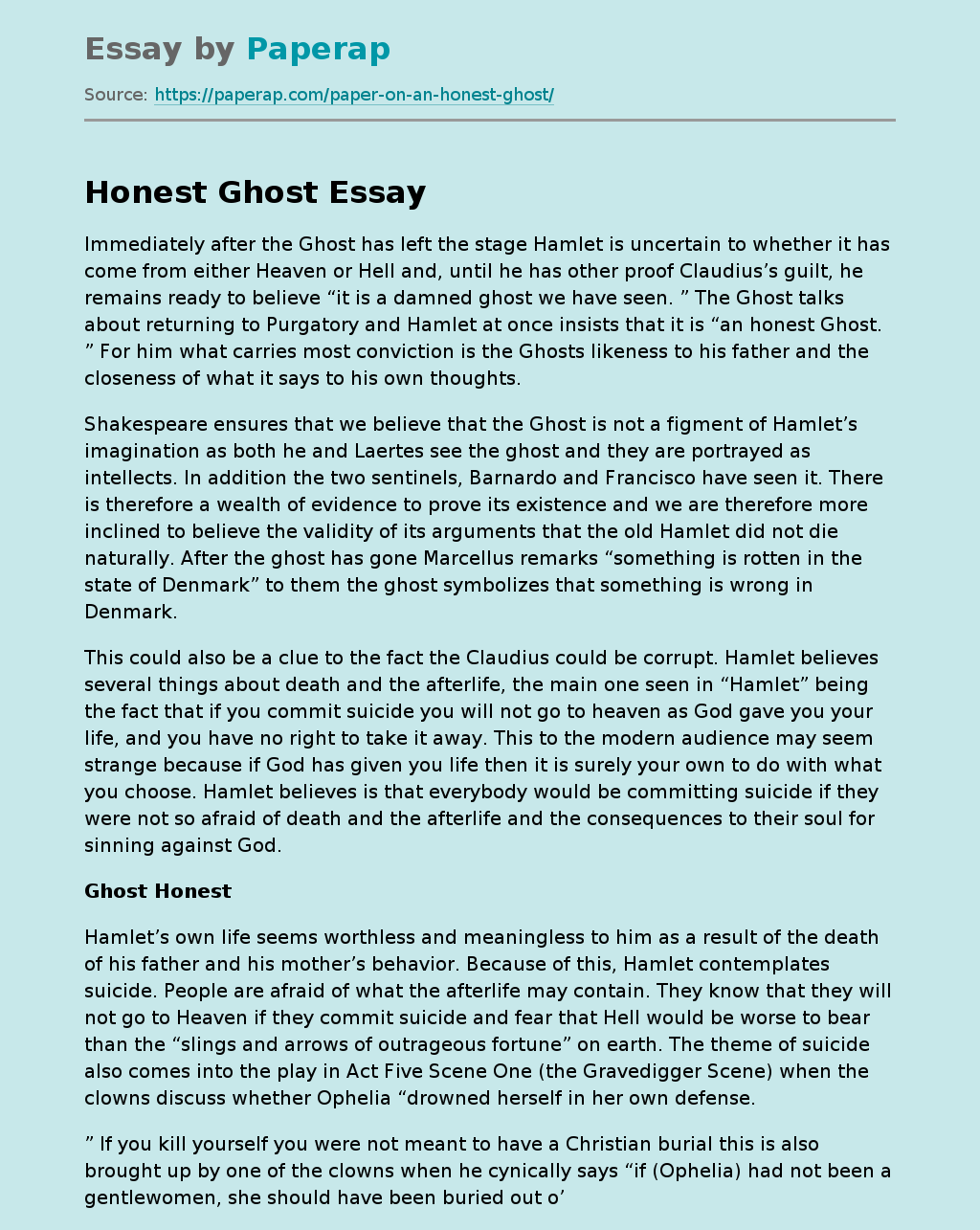The following sample essay on “Honest Ghost Hamlet” discusses Shakespeare’s world famous work. In particular, the image of the Ghost and Hamlet is analyzed.
Immediately after the Ghost has left the stage Hamlet is uncertain to whether it has come from either Heaven or Hell and, until he has other proof Claudius’s guilt, he remains ready to believe “it is a damned ghost we have seen. ” The Ghost talks about returning to Purgatory and Hamlet at once insists that it is “an honest Ghost.
” For him what carries most conviction is the Ghosts likeness to his father and the closeness of what it says to his own thoughts.
Shakespeare ensures that we believe that the Ghost is not a figment of Hamlet’s imagination as both he and Laertes see the ghost and they are portrayed as intellects. In addition the two sentinels, Barnardo and Francisco have seen it. There is therefore a wealth of evidence to prove its existence and we are therefore more inclined to believe the validity of its arguments that the old Hamlet did not die naturally.
After the ghost has gone Marcellus remarks “something is rotten in the state of Denmark” to them the ghost symbolizes that something is wrong in Denmark.
This could also be a clue to the fact the Claudius could be corrupt. Hamlet believes several things about death and the afterlife, the main one seen in “Hamlet” being the fact that if you commit suicide you will not go to heaven as God gave you your life, and you have no right to take it away.
This to the modern audience may seem strange because if God has given you life then it is surely your own to do with what you choose. Hamlet believes is that everybody would be committing suicide if they were not so afraid of death and the afterlife and the consequences to their soul for sinning against God.
Hamlet’s own life seems worthless and meaningless to him as a result of the death of his father and his mother’s behavior. Because of this, Hamlet contemplates suicide. People are afraid of what the afterlife may contain. They know that they will not go to Heaven if they commit suicide and fear that Hell would be worse to bear than the “slings and arrows of outrageous fortune” on earth. The theme of suicide also comes into the play in Act Five Scene One (the Gravedigger Scene) when the clowns discuss whether Ophelia “drowned herself in her own defense.
” If you kill yourself you were not meant to have a Christian burial this is also brought up by one of the clowns when he cynically says “if (Ophelia) had not been a gentlewomen, she should have been buried out o’ Christian burial” We in the modern age find this peculiar but in the time the play was written this was the usual practice. The Jacobean audience believed that you have no right to commit suicide as God gave you life and therefore had no right to a Christian burial.
The King would have used his influence regarding Ophelia so she would get a Christian burial, which points to the hypocrisy of the rich, and powerful who are able to buy themselves and their friends privileges. In the same scene Hamlet talks about Yorick “the Kings jester” and remembers how he was. “Here hung those lips I have kiss’s I know not how oft. Where be your gibes now, your gambols, your 190 songs, your flashes of Merriment that were wont to se the table on a roar. ”
Hamlet thinks that it is sad that Yorick has ended up as a bag of bones, yet acknowledges that he believes in the afterlife when he tells his spirit to go to Gertrude’s “chamber and tell her, let her paint an inch thick, to this favour she must come… ” Death he is pointing at, makes everyone equal. Even his mother, the queen, will one day be reduced to a pile of bones. The modern audience’s view of the afterlife is very split some people believe in it and some people do not.
However the Shakespearean audience, like Hamlet would have believed in the afterlife and would have recognized the difference between the mortality of the body and the external life of the soul. When he has the opportunity to, Hamlet does not kill Claudius while he is praying because the church believed that if a person is praying, as he dies his soul is absolved and he will go to Heaven. Hamlet does not want Claudius to go to Heaven when his father who was poisoned and didn’t have time to pray is committed to Purgatory.
This is a double irony because Claudius can not pray effectively since, to absolve his soul of sin, he would have to give up his wife and his throne in order to show true penitence. However God is looking after him because Hamlet thinks that he is praying so therefore he does not kill him. While the Jacobean audience would understand this view point, the modern one could possibly interpret it as further procrastination by Hamlet and a symptom of his indecisiveness.
Hamlet wants to be able to kill Claudius however 1″something inside him” will not allow him to. Hamlet has a sense of morality, which rises above vengeance. In the eyes of the modern audience it seems strange that even though the old Hamlet was probably a better person than Claudius, he should be committed to Purgatory simply because he did not have time to pray, whereas Claudius who having killed his brother and who is now having sexual relations with his brother’s wife, can be let off by just praying before he dies.
Honest Ghost "Hamlet". (2019, Dec 05). Retrieved from https://paperap.com/paper-on-an-honest-ghost/

